The Supreme Court on Wednesday reserved its verdict on the dispute going on between the Union of India and the Delhi Government regarding administrative control over transfers and postings of civil servants in Delhi.
The five-Judge Constitution Bench of Chief Justice of India (CJI) D.Y. Chandrachud, Justice M.R. Shah, Justice Krishna Murari, Justice Hima Kohli and Justice P.S. Narasimha reserved judgment on the petition related to administrative control on civil servants in Delhi.
Appearing for the Centre, Solicitor General Tushar Mehta sought reference of the matter to a larger Bench, stating that the 2018 Constitution Bench of the Apex Court interpreting Article 239AA of the Constitution and laying down powers of the Delhi government, was not in tune with an earlier nine-Judge Bench verdict of the top court.
He said the 2018 judgment of the Constitution Bench in the case GNCTD vs Union of India was inconsistent with the nine-Judge Bench judgment in the case NDMC vs State of Punjab (1996), which had held that Delhi was on the same footing as a Union Territory.
The SG pointed out that the Constitution Bench had, in the 2018 verdict, asserted the principle of supremacy of elected government and held that the LG should act as per the aid and advise of the Council of Ministers in respect of the matters over which the Delhi Government has executive and legislative powers and that the LG’s reference to the President should only be made in exceptional circumstances.
He said the Government may not be remembered as “handing over the national capital to complete anarchy”.
The Solicitor General then sought permission to file a two-page note on the Prem Chand Jain verdict and why it was not a good law. The note would further contain a prayer for reference, he said.
The Bench, while observing that the reference was never argued earlier, asked the SG as to how could he argue the reference now. It said the Apex Court was on rejoinder (arguments) now.
SG Mehta contended that the contours of federalism between the Centre and states needed a re-look and this was the reason for reference.
The Bench then observed that if it was the issue of reference, the Bench would have looked at it from a different way. This was not covered in arguments,it added.
Senior Advocate Abhishek Manu Singhvi, representing the Delhi government, also opposed the Centre’s request.
He contended that the matter had come before the Division Bench at least for 10 times over a year. Reference was not mentioned during this time. Now 3.5 years after the 2018 judgment, a review was being sought.
When the SG said that he has argued all points of reference without mentioning reference in his arguments, the Counsel for Delhi government said that this would be hugely dilatory.
The SG contended that it could be anything but dilatory, stating that the Apex Court was dealing with the capital of the nation.
The Supreme Court permitted the SG to circulate the note, noting that this was a question of law.
Singhvi registered a strong objection to the same, stating that this would be made a ground for a future nine-Judge reference. While concluding his arguments, the Senior Counsel said the Centre was attempting to ‘overreach’ and exercise control.
Earlier during the arguments on Tuesday, SG Mehta had expressed his resentment over Delhi Chief Minister Arvind Kejriwal staging a protest rally seeking LG’s permission for teachers to go to Finland for training.
Singhvi responded by saying that when it came to stalling legitimate exercise of legislative and executive powers of the Delhi government, there was lot that it could accuse the Union government over.
Stating that protests and theatrics could not be a substitute for court proceedings, the SG contended that theatrics, coupled with repeated feeding of lies, would not yield results in a constitutional court.
He added that he did not want to reduce the level of arguments to the level of theatrics.
Singhvi replied that the issues before the Supreme Court were ‘purely constitutional’ and there was no need to reduce the debate to any level other than the Constitution.
The Apex Court observed that the constitutional questions arising in the case could not be decided on anything except using the touchstone of the Constitution.
On a question related to the control of Delhi government on posting of bureaucrats, the SG said that the Delhi government and its Ministers had complete functional control over the bureaucrats and could transfer a civil servant from one department to the other by sending the request to the cadre controlling authority in the Union Ministry of Home Affairs through the LG.
He added that no bureaucrat could be disobedient or indifferent to the orders of the Ministers as all senior bureaucrats’ Annual Performance Appraisal Report (APAR), which was crucial to their career progression, was written by the Chief Minister of Delhi.
For the past three years, Kejriwal has been evaluating the bureaucrats, giving them between 9 and 10 marks on an average, out of maximum 10, SG Mehta pointed out.


